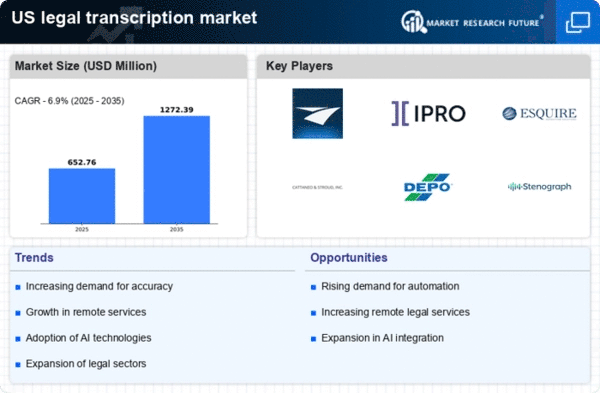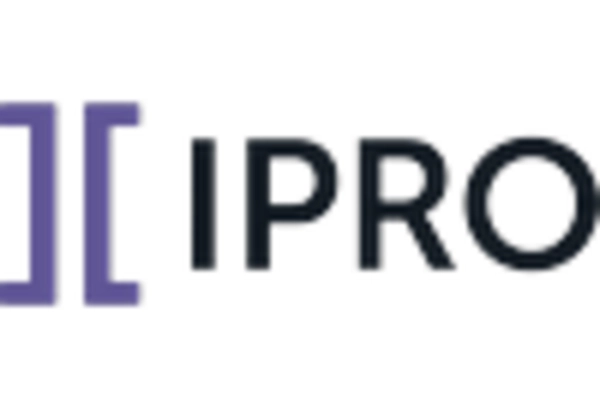Expansion of Remote Legal Services
The expansion of remote legal services has a profound impact on the legal transcription market, as more legal professionals operate in virtual environments. This shift necessitates the need for efficient transcription services that can accommodate remote workflows. In 2025, it is anticipated that remote legal consultations will account for over 50% of all legal services provided, creating a substantial demand for transcription services that can seamlessly integrate into these virtual practices. The legal transcription market must adapt to this evolving landscape, ensuring that transcription services are accessible and effective for remote legal teams. This trend not only enhances the efficiency of legal operations but also broadens the market's reach, allowing transcription providers to cater to a diverse clientele.
Growing Demand for Accurate Documentation
The legal transcription market experiences a growing demand for accurate documentation, driven by the increasing complexity of legal proceedings. As legal cases become more intricate, the need for precise and reliable transcripts escalates. Legal professionals require verbatim records to ensure that all details are captured accurately, which is crucial for case outcomes. In 2025, the market is projected to reach approximately $1.5 billion, reflecting a compound annual growth rate (CAGR) of around 6.5%. This growth indicates a robust need for transcription services that can provide high-quality documentation, thereby enhancing the efficiency of legal processes. The legal transcription market is thus positioned to benefit from this trend, as law firms and courts increasingly prioritize accuracy in their documentation practices.
Regulatory Compliance and Legal Standards
Regulatory compliance plays a pivotal role in the legal transcription market, as legal entities must adhere to stringent standards for documentation. The legal transcription market is influenced by various regulations that mandate accurate record-keeping and transcription practices. For instance, compliance with the Federal Rules of Civil Procedure necessitates that transcripts be produced in a specific format, ensuring their admissibility in court. This regulatory landscape compels law firms to invest in professional transcription services that can meet these requirements. As a result, the market is expected to grow, with an estimated increase of 5% in demand for compliant transcription services by 2026. This trend underscores the importance of maintaining high standards in legal documentation, further driving the growth of the legal transcription market.
Increased Litigation and Legal Proceedings
The rise in litigation and legal proceedings contributes to the expansion of the legal transcription market. As more individuals and organizations engage in legal disputes, the demand for transcription services grows correspondingly. In 2025, the number of civil cases filed in federal courts is projected to increase by approximately 4%, leading to a heightened need for accurate and timely transcripts. This trend indicates that law firms will require reliable transcription services to support their case preparations and court presentations. The legal transcription market is thus likely to see a surge in demand, as legal professionals seek to ensure that all proceedings are documented comprehensively and accurately, thereby facilitating better case management.
Technological Advancements in Transcription Tools
Technological advancements significantly impact the legal transcription market, as innovations in transcription tools enhance efficiency and accuracy. The integration of artificial intelligence (AI) and machine learning technologies into transcription services allows for faster turnaround times and improved accuracy rates. In 2025, it is estimated that AI-driven transcription solutions could account for nearly 30% of the market share, reflecting a shift towards automated processes. However, while these technologies offer potential benefits, they also necessitate a skilled workforce capable of managing and overseeing these tools. The legal transcription market must adapt to these changes, ensuring that professionals are trained to utilize advanced technologies effectively, thereby maintaining the quality of transcription services.
















